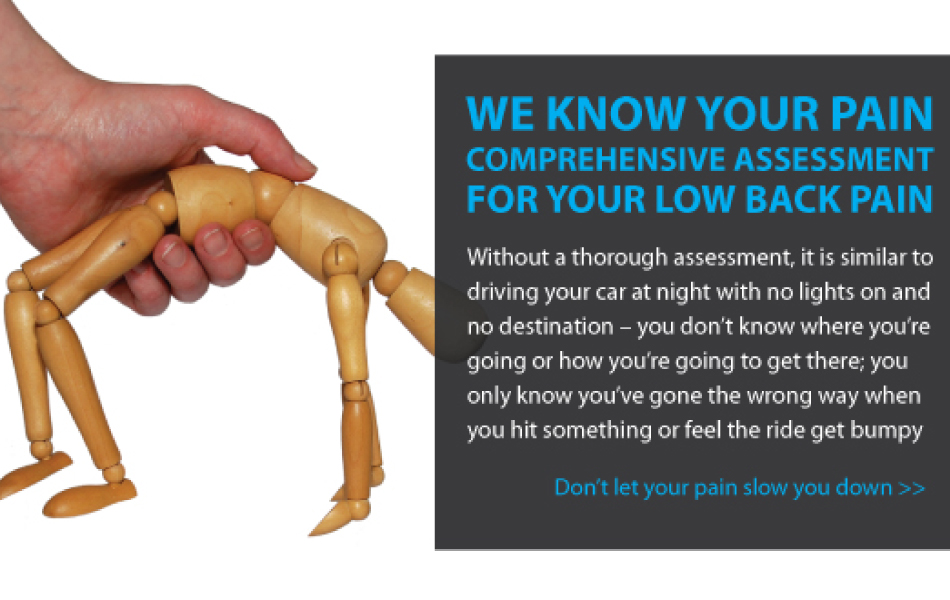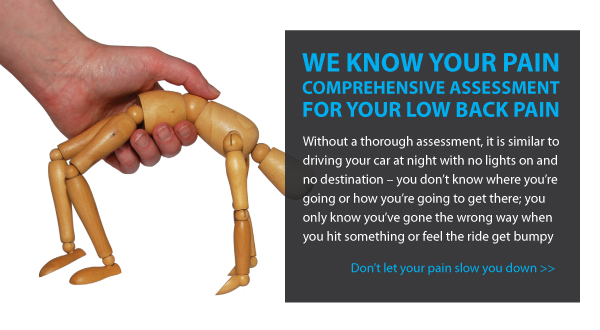Total Therapy Blog

Back Pain – Why Assessments Matter

Every year, low back pain costs Canada billions of dollars in lost productivity and healthcare expenditures. In B.C., low back pain represents nearly a quarter of all WorkSafe BC claims, with an average age of 37 years at the time of the claim (http://www.worksafebc.com/health_care_providers/Assets/PDF/poster-presentations/low_back_pain1987-2001.pdf).
What these numbers do not reveal, however, is the personal physical, social, and financial tolls of having to deal with low back pain. For a person dealing with low back pain, it can be a debilitating and demoralizing experience. For these people, timely and effective treatment of the cause of their low back pain is critical. It’s understandable, then, why most people want to jump into treatment immediately. When you have back pain, you want relief – right away. Having to do an assessment before getting treatment can seem like an unnecessary delay – however, it’s a critical part of developing an effective treatment plan.
The type of treatment a physiotherapist, chiropractor, RMT, or physician provides depends on the assessment. To develop a treatment plan without this information would be similar to driving your car at night with no lights on and no destination – you don’t know where you’re going or how you’re going to get there; you only know you’ve gone the wrong way when you hit something or feel the ride get bumpy.
So what does an assessment entail? Assessments generally have 4 broad components:
 History taking.
History taking.
Your physiotherapist, chiropractor, RMT, or physician will ask you questions about your health history. Things like previous injuries, surgeries, accidents, or other treatments tried are pieces to the puzzle that guide your therapist in their assessment. You may also be asked questions about current medication, your work, daily activities, and sleeping habits.
Current subjective complaint(s).
Subjective essentially means what bothers you. Is your pain constant, or does it fluctuate? Where is it located? What’s the nature of your pain (e.g. burning, numb, tingling, stabbing, etc.)? What do you find aggravates it? What relieves it? This information provides clues as to what the underlying factors may be to your pain. For example, a client who complains of an aching pain in their low back that’s made worse with sitting or bending forward to tie their shoes may be dealing with vertebral disc-related problems. The more specific and accurate you can be, the easier it is for your therapist to pinpoint the cause.
Objective measurements / observations.
This part of the assessment involves the typical ‘hands-on’ testing that we normally associate with assessments. The type of objective testing your physiotherapist, chiropractor, RMT, or physician performs will be guided by your history and subjective reports. Your assessment may include postural and movement observations, range-of-motion testing, and special tests designed to investigate more specific questions. An assessment is essentially a process of elimination – you start with a big range of possibilities, and then you progressively narrow down those possibilities until you arrive at the correct conclusion.
 Treatment plan discussion.
Treatment plan discussion.
After your assessment, your therapist will talk to you about their findings and what approach they recommend. You may or may not receive treatment that day. If you don’t receive treatment that day, it’s not to inconvenience you – it’s just that your therapist may suspect something is going on that requires further investigation (e.g. an x-ray, MRI, or specialist consultation). At the end of the day, any treatment provided has to be safe and effective. If your therapist feels that providing treatment the day of your assessment isn’t a good idea, they’ll explain why and give you the opportunity to ask questions.
Overall, assessments are a critical component of safe, effective treatment. A comprehensive assessment is like building a solid foundation for a house – the better and truer the foundation, the better the final result. At the end of the day, that’s what everybody with low back pain wants – the best outcome possible!








Follow Us!
& Stay Up To Date
BLOG